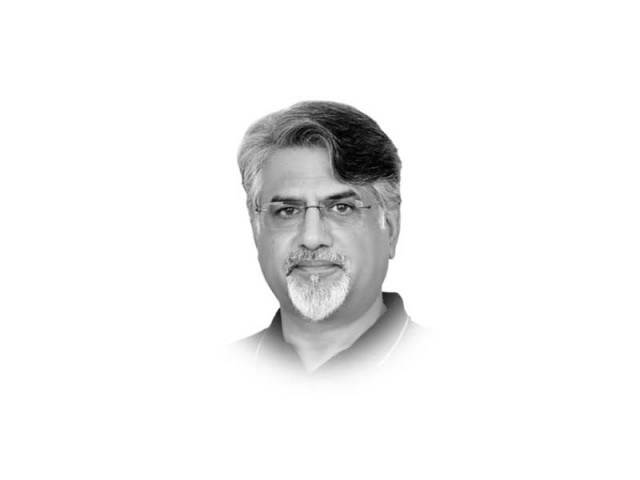SAARC alternative: myth or reality?
SAARC has a South Asian identity whereas China is not in South Asia but East Asia.

This week a news item was flashed on font pages of almost all the newspapers in Pakistan. The news was about the possibility of creation of an alternate organisation to replace the dysfunctional regional organisation SAARC
. The idea of creating this alternative organisation is probably built on the premise that over the years India-Pakistan tensions have stalled and made SAARC dysfunctional so an alternate organisation be created that should exclude India.
If this premise is right - which I think is so - then it leads to many pertinent questions that must be first correctly answered. Currently, China is a SAARC observer and not a member country but the core of the alternative SAARC organisation being proposed is anticipated to be built around the two nuclear powers in the region, China and Pakistan.
SAARC has a South Asian identity whereas China is not in South Asia but East Asia. China shares a very long border with India and borders with Nepal, Bhutan, Pakistan and Afghanistan but geographically China is not part of South Asia. So, to start with, any imaginative alternative organisation led by China that is being considered as a replacement to SAARC will represent a geographic space that can be called anything but representing South Asia. ASEAN, Arab League, OIC and EU are organisations that represent ideological and geographic identities.
Attainment of regional peace, economic cooperation and non-interference in internal affairs are the core concepts around which these organisations are structured and on the basis of which they operate. The ideal goal for all of them is to promote and achieve Arab, South East Asian, Muslim and European unity but essentially all these organisations except OIC represent a region and its priorities.
If China takes a lead to replace SAARC then that imaginative organisation will neither represent association of South Asian countries nor the region of South Asia. In any case SCO as a regional organisation, led by the two great land powers, Russia and China, already exists and much that is being imagined to be achieved by an alternate to SAARC can be achieved under the mandate of SCO.
Pakistan might view the creation of an alternative organisation to SAARC as a win-win situation for it, as this would indicate a regional dissatisfaction of India's role and may mean a diplomatic victory for Pakistan.
But what about the geopolitical and strategic implications? Geopolitically, there are more chances that the region will be further divided into pro-India and anti-India blocs. India led SAARC as its economic engine and many countries in the region excluding Pakistan depended on Indian aid, infrastructural development and trade.
Strategically, India will contest any attempt by China to interfere in its sphere of influence and disturb the already existing Indian dominance and control.
Countries like Bhutan and Maldives that are heavily dependent on India for their trade and security will not prefer to join any anti-India bloc. It will also be not easy for Bangladesh and Nepal to do the same as both countries have a history of shared interests with India and both share borders with India. Sri Lanka too will find it difficult to become part of an anti-India bloc as it also heavily depends on India for aid, trade and fuel supplies. Sri Lanka was a recipient of $4 billion aid from India during its economic crisis of 2022-23.
The most interesting is the question about Afghanistan and why it will not like to become part of any anti-India organisation or bloc. Historically, Afghanistan has always stood up to fight any attempts aimed to control it externally. The not so friendly relations between Afghanistan and Pakistan are also built around this core Afghanistan policy concept. Over the years India has offered development oriented and non-interventionist aid to Afghanistan.
India invested $3 billion in Afghanistan, building schools and colleges, Afghan Parliament, Salma Dam and roads including Zaranj-Dilaram Highway that connects Afghanistan to Iran. There was news of Afghanistan planning to even have a naval fleet at Iran's Chabahar Port. India has invested in the Iranian port with a view to bypassing Pakistan for trade with Afghanistan.
The Eastern Corridor of INSTC (International North South Transport Corridor) ends in Afghanistan and makes Afghanistan part of this alternate transport corridor against BRI. Afghanistan maintains cordial relationship with India to balance against Pakistan's influence and control; and so, for Afghanistan to join any alternative organisation which is anti-India and led by China and Pakistan will not be an easy decision to make.
Considering that India is a rising power, a land bridge which ensures connectivity of South Asian countries and which also maintains a big naval presence in the Indian Ocean excluding India from any future alternative organisation to replace SAARC will only weaken rather than bolster regional cooperation and problems.
There are both the economic and realistic logics for creating an alternative organisation to replace SAARC. The economic logic addresses the problem of how to get rich, to maximise prosperity by creating organisations that can promote economic deals and investments with other countries.
However, the first question that states ask as actors in the regional and international system is a realist question and that question is - how best to survive? The economists prefer to get rich but the realists prefer to be more powerful to be able to survive and whenever both the economic and realist logic find themselves in a conflict it is always the realist logic that states prefer.
States prefer to become part of regional and international organisations and institutions. EU and NATO came into existence under the same concept. Over the years, EU has done so well because the US through NATO provided EU the security umbrella and instead of competing for security the EU countries invested in their economies.
But this has come at a cost. EU does what the US asks it to do. EU's collective foreign policy is driven due to its economic and security relationship with the US. Today, most European countries realise that they don't have an independent foreign policy and they are beholden to the US.
Built only on an economic logic, any alternative to SAARC led by China seems to be a bright idea but seen from a realist perspective there are many questions that the states will have to answer related to their foreign policy and overall security. It is by getting right answers to these questions that the very idea of having an alternative to SAARC will either fail or succeed.





1729685382-0/Untitled-design-(57)1729685382-0-208x130.webp)











COMMENTS
Comments are moderated and generally will be posted if they are on-topic and not abusive.
For more information, please see our Comments FAQ